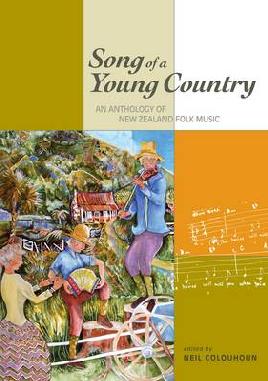Music was a welcome distraction for New Zealand’s early European settlers, who brought songs with them from their homelands, and who quickly developed new folksongs and ballads to sing about and cope with their harsh experiences of life in New Zealand. Much early European New Zealand music focuses on life on the frontier whaling and sealing, later the goldrushes, agricultural labouring, and taking to the road with a swag in hard times. Listen to this album example, Under the Southern Cross , traditional folk songs sung by Phil Garland.
Perhaps the most famous early New Zealand folksong is the anonymous ballad Davy Lowston, the lament of a sealer marooned at a forlorn outpost in South Westland.
My name is David Lowston, I did seal, I did seal,
My name is David Lowston, I did seal,
Though my men and I were lost,
Though our very lives twould cost,
We did seal, we did seal, we did seal
The shipboard diary of John Richardson, taken on his journey from Edinburgh to Wellington in 1864 on the West Australian, includes the lyrics to three folksongs. Part of our Heritage collection, you can turn the pages of the diary and read the lyrics for yourself as they appear in the original document.
The Englishman, Charles Thatcher, made a name for himself as a popular balladeer and singer in the Victorian goldfields and made several tours of New Zealand, having a great success lampooning local personalities, events and scandals with his topical ballads. His songs were published and sung so often that many of them became genuine folksongs.
The missionaries brought musical instruments with them and of course hymns, psalms and other church music. The easily portable cottage cabinet piano, or a square piano was often recommended. On board the first colonists ships there was the music of the fiddle, the concertina and flute. Once they arrived they were soon forming groups and musical societies to perform church music, classical music and of course music for entertainments such as dances. Choral classes began in Lyttelton as early as 1852.
As towns were established theatres were built and were host to local and touring entertainers vaudeville companies, operatic companies and solo musicians.
Male voice choirs, brass bands and women’s choirs sprang up throughout the country, often to continue musical traditions from Britain. in 1860, the Canterbury Vocal Union began what was later to become the Royal Christchurch Music Society. The Union/Society is still operating today as the Christchurch City Choir.
Groups like the Canterbury Vocal Union were active in the 1860s attending events such as fundraisers for the Canterbury Mechanics Institute library, the precursor to Christchurch City Libraries.
In 1879, ChristChurch Cathedral appointed English choirmaster and organist Harry Wells who, in 1881, began the full cathedral choir still operating today. According to the Cathedral, it is a part of a unique, centuries-old tradition that has no equivalent outside the English-speaking world. ChristChurch Cathedral shares with the Cathedral of St Andrew, Sydney, the distinction of being the only cathedral outside Britain to have its own Choir School (the Cathedral Grammar School).
The influence of European music on Māori was also significant. Māori were enthusiastic adopters of many European tunes, creating their own lyrics in te reo māori for many of the songs being sung by European New Zealanders. The broader tonal range of European music also changed the way Māori harmonised, creating increased variety in Māori music. See our page about Māori music.
In the twentieth century folksongs continued as songs of protest from the early struggles of the trade union movement as well as songs from working life. Balladeer Joe Charles was born in Timaru and wrote about farming life, the high country, the pubs and the characters he met.
See our Christchurch music timeline for a local perspective on key stages in the development of music in New Zealand.
We continue the story of New Zealand music in our Radio rules the airwaves feature, looking at the years 1900 to today.
Further information
Search our catalogue
-
 Great New Zealand Songbook, by Les Cleveland (music)
Great New Zealand Songbook, by Les Cleveland (music) - New Zealand folksongs: song of a young country, by Neil Colquhoun
- Shanties by the way: a selection of New Zealand popular songs and ballads, by Rona Bailey & Herbert Roth
- When the Pakeha sings of home: a source guide to the folk and popular songs of New Zealand, by Mike Harding
- Black Billy Tea, by Joe Charles
- The Oxford History of New Zealand Music, by John Mansfield Thomson - a survey of music in New Zealand which has chapters on the history of music in New Zealand.
- New Zealand folksongs.
- Choral works by Christchurch Choirs Christchurch City Choir Choral Societies of Christchurch Music Choirs of Christchurch (Add these links as sub bullets)
Explore our resources
- Radio rules the airwaves our page on NZ music from 1900 to today. (Add our page on)
- Māori Music - our page on traditional māori music.
- Our recommended web sites of New Zealand artists, bands and music information.
Online resources
- On-Demand Audio and Video programmes on New Zealand music. Remove link and replace with Music on demand Radio New Zealand Music Videos New Zealand on Screen or remove link also add these links are on NZ music since 1900 page
- New Zealand Folksong - comprehensive gateway to New Zealand folksongs, traditional and contemporary. Includes words, music and sound files for many songs. Often includes information about history of the song and social context. There are also articles about New Zealand folksong collecting and a useful feature where folksongs are collected in topics for school projects.
- Music in An Encyclopaedia of New Zealand, 1966. edited by A. H. McLintock (Add this reference)
- Folk, country and blues music (add this reference)




Add a comment to: Early New Zealand music